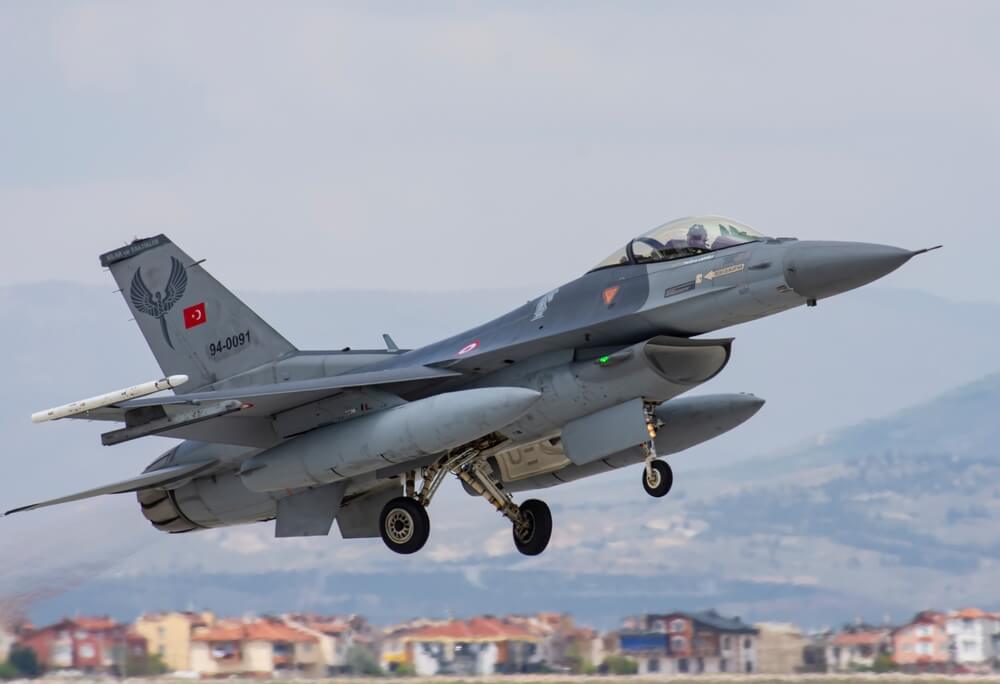The verbal war between Turkey and Israel has been ongoing since the start of the Israeli operation in Gaza, but has taken on a new dimension following Turkish leader Recep Tayyip Erdoğan's statement that his country could also intervene militarily.
The Turkish leader refrained from making any further statements besides the one he made on Sunday: "We must be very strong so that Israel can't do these ridiculous things to Palestine. Just like we entered Karabakh, just like we entered Libya, we might do similar to them."
Neither he nor his AK Party, at whose meeting he stated this, explained further how Turkey could intervene in the conflict between Israel and Hamas, but the fact remains that the Turkish president hinted at the possibility of military involvement for the first time.
Erdoğan's parallel with Libya and Karabakh leaves no doubt that he talked about military intervention in the conflict between Israel and Hamas, despite the fact that Turkey had previously denied being directly involved militarily on the side of Azerbaijan in the conflict with Armenia over the disputed Karabakh region.
The president's combative statement on Sunday fuelled the otherwise difficult rhetoric between Turkey and Israel. The head of Israeli diplomacy, Israel Katz, compared Erdoğan to Saddam Hussein and threatened, "Just let him remember what happened there and how it ended."
The response from Ankara was not long in coming: "Just as genocidal Hitler ended, so will genocidal Netanyahu," stated the Ministry of Foreign Affairs in Ankara.
The Palestinians' number-one ally
Erdoğan's "belligerent" statement against Israel comes at a time when the actions of Benjamin Netanyahu's government in Gaza have never received less support from its allies and never more condemnation from Islamic countries, even those that have maintained a neutral position for a long time.
The Turkish president wants to position himself as the most important, or at least one of the most important, representative of the Palestinian cause among its allies. He has been doing this systematically and over a long period of time, demonstrating a protective attitude towards the Palestinians in practice.
Erdoğan accepts the risk of confrontation with Western partners, particularly those in NATO
He accepts the risk of confrontation with Western partners, particularly those in NATO, because he takes a tolerant stance towards Hamas, which is considered a terrorist organisation by everyone else in the Alliance.
Moreover, in his recent meeting with Greek Prime Minister Kyriakos Mitsotakis in Ankara, the Turkish leader added the attitude towards Hamas to all the other bilateral problems they have.
"I don’t see Hamas as a terrorist organisation," said the Turkish president during the meeting with the Greek PM last May, to which the guest replied, "We can agree to disagree on this topic."
Disagreements in NATO
Turkey's NATO partners will certainly not approve of Erdoğan's combative statements against Israel, regardless of the fact that members of the Alliance have major reservations and criticism of the Israeli government's behaviour.
But President Erdoğan firmly insists that NATO refrains from collective cooperation with the Israeli government. "Until comprehensive, sustainable peace is established in Palestine, attempts at cooperation with Israel within NATO will not be approved by Turkey," said the Turkish president at the end of the NATO summit in Washington.
By attending this summit, Erdoğan wanted to emphasise that he prioritises relations with his partners within NATO. Shortly before the July summit, Erdoğan cancelled his visit to Washington and the meeting with US President Joe Biden last May, just as he recently cancelled the meeting with European partners at the European Political Community summit in the UK two weeks ago.
 Coincidentally or not, Erdoğan's combative rhetoric comes at a time when Turkey is expecting the long-awaited delivery of US F-16 fighter jets
Coincidentally or not, Erdoğan's combative rhetoric comes at a time when Turkey is expecting the long-awaited delivery of US F-16 fighter jets
His even harsher rhetoric towards Israel, which goes so far as to mention Turkey's military involvement, is (for now) the culmination of a protectionist policy towards the Palestinians, including Hamas, where the Turkish leader wants to position himself as the most influential partner.
After blocking trade relations with Israel worth some $7 billion annually (primarily Turkish exports to Israel), Erdoğan received Hamas leader Ismail Haniyeh last May, which identified Turkey as its first-class ally.
Coincidentally or not, Erdoğan's combative rhetoric comes at a time when Turkey is expecting the long-awaited delivery of US F-16 fighter jets. Following his return from the NATO summit in Washington, the Turkish president revealed that US President Joe Biden had assured him of resolving the aircraft delivery issues "within 3–4 weeks."
This timeframe coincides exactly with Erdoğan's aggressive statement towards Israel, which can also be interpreted as part of the pressure on the US to speed up the delivery of the aircraft worth $23 billion.
Weakening the enemy in the country
Erdoğan's messages to Israel are undoubtedly also aimed at his domestic political rivals, with the aim of making them even weaker on the Palestinian issue, which is receiving a great deal of attention in Turkey.
Following his defeat in the local elections last April, Erdoğan wants to slow down the growth of his opposition rivals and has been using the Palestinian issue as a trump card.
Opposition leaders, including the liberal mayor of Istanbul and likely next joint presidential candidate, Ekrem İmamoğlu, describe Hamas as a terrorist organisation
Opposition leaders, including the liberal mayor of Istanbul and likely next joint presidential candidate, Ekrem İmamoğlu, describe Hamas as a terrorist organisation, even though they condemn the suffering of Palestinians under Israeli attacks.
This position exposes them to attacks from opponents who accuse them of not showing solidarity with the Palestinians, where Erdoğan and his party score points based on their support for the Palestinians, including Hamas, and particularly with their confrontation with Israel.